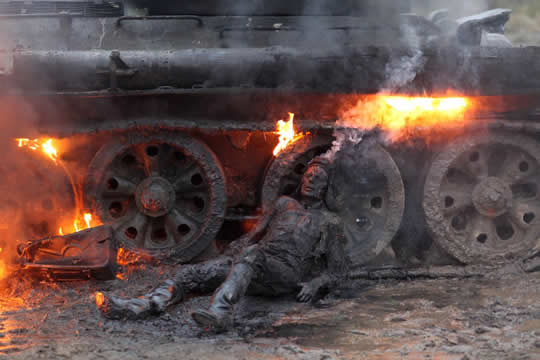 The story of WHITE TIGER, Russia’s 2013 Oscar Entry happens when World War II is drawing to a close and furious and prolonged fighting is exhausting both the Soviet and the fascist troops. The more decisive the advance of the Soviet army, the more often White Tiger, a huge, indestructible fascist tank, appears in the battlefield. It relentlessly emerges from the smoke of combat, ruthlessly destroys the adversary and swiftly vanishes. No one can either verify or refute its existence. However, the Soviet military command decides to build an extraordinary tank – a special version of the T-34.
The story of WHITE TIGER, Russia’s 2013 Oscar Entry happens when World War II is drawing to a close and furious and prolonged fighting is exhausting both the Soviet and the fascist troops. The more decisive the advance of the Soviet army, the more often White Tiger, a huge, indestructible fascist tank, appears in the battlefield. It relentlessly emerges from the smoke of combat, ruthlessly destroys the adversary and swiftly vanishes. No one can either verify or refute its existence. However, the Soviet military command decides to build an extraordinary tank – a special version of the T-34.
The crew of this tank is headed by a man with a remarkable past, a tank crewman who was almost burnt alive in combat and doomed to death. Contrary to all expectations, he survives, recovers and returns to the ranks. He does not know his own name, he does not remember anything from his past, but he has acquired the unusual ability to understand the language of tanks. He is sure that the elusive fascist tank exists and must be destroyed, because White Tiger is the embodiment of war, its terror and its blood.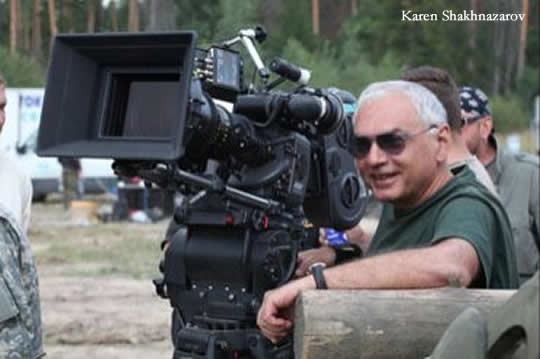
Remaining true to documented events of the war and featuring historic personalities (Zhukov, Hitler, Keitel) the film director adds to the story elements of mysticism, enriching our understanding of the war to include the eternal struggle between Good and Evil.
WHITE TIGER is directed by Karen Shakhnazarov. In 1975 Karen graduated from VGIK (All-Union State Institute of Cinematography), where he studied directing in Igor Talankin’s workshop. Since 1976 Karen Shakhnazarov has been directing films produced at Mosfilm Studios. Since 1987 – Art Director of Artistic Association Start (in 1990 renamed into Courier Studio) of Mosfilm.
Since 1991 Karen Shakhnazarov has served as Art Director and Chairman of the Board of Courier Studio of Mosfilm Cinema Concern and in 1998 he started his work as General Director of Mosfilm Cinema Concern. Under his management the principal film studio of Russia overcame the deep crisis of the nineties and grew into Europe largest, unique film production complex of the highest world standards. Most of Russian film, TV, video content is produced at the facilities of Mosfilm.
The films directed by Karen Shakhnazarov were presented at many prestigious international film festivals and won over twenty awards in various nominations. His film WARD NO. 6 was the official entry from Russia into the AMPAS Oscar awards competition for 2009 in the Best Foreign Language Film category.
Bijan Tehrani: You made WHITE TIGER based on a novel. Tell me of your main motivation for picking this book for an adaptation.
Karen Shakhnazarov: First of all, I liked the story and it seemed to me that there was a resemblance with Moby Dick. I love that book, Moby Dick! What interested me very much was that this story was transcribed in World War II. That was probably the main motivation for me.
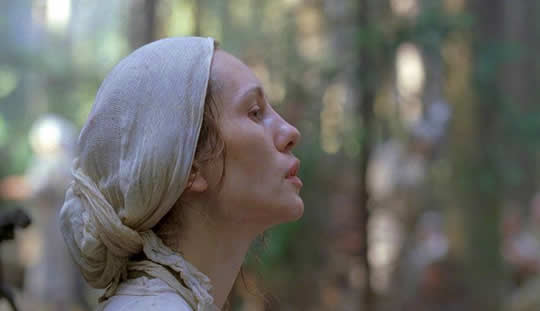 BT: I think it is always a very challenging job to adapt a good book. How much are you faithful to the book and how much did you have to change it to fit the film medium?
BT: I think it is always a very challenging job to adapt a good book. How much are you faithful to the book and how much did you have to change it to fit the film medium?
KS: The film is rather far away from the book. The main thing was to preserve the story, the story of the mystic tank but we changed a lot of things, the script of the film was very different from the book. The difference is great, really.
BT: It is one of the rare movies that brings war to a personal level, it makes it easier for the viewer to identify with and understand the situations. This is done very successfully.
KS: That was in fact one of the main targets when I was making the film. I believe that today a new approach to depicting war is necessary and in this sense the personal level that you felt in the film is, I believe, the most interesting and most direct approach for today.
BT: The casting is done brilliantly. For example, Aleksey Vertkov, you can’t think of anyone else to play the part. How did you go about casting and finding the actors for this film?
KS: It was actually a very difficult problem to find very good actors for the film. On the other hand, the idea was to engage actors who were not very famous so that their faces would not be something that everyone knows and recognizes. You will know that the best actors are always the famous ones but we were lucky we could find these young actors. I believe they are very talented indeed and very interesting, and their faces are not so familiar. I should probably say we just had good luck.
BT: There was great harmony between the actors. It was clear that a very powerful director had been guiding the actors; you could sense a harmony and understanding on the set. How did you work with them? How much did you rehearse?
KS: I trusted the actors and I sooner gave them some lead right on the set. We did not rehearse much. They were very sensitive and they understood the idea and the material very well so they did not need pressure on my side. I would prompt things, make suggestions, that was what I did.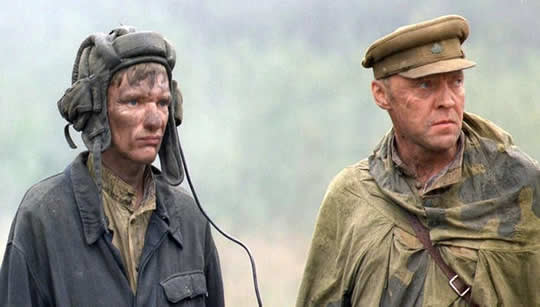
BT: As a film critic, I had been wanting to see war scenes in the same quality we had in Mikhail Kalatozov, which you achieve while bringing a fresh mind. Were you influenced by the Russian cinema of that time?
KS: I myself have very great appreciation for the old Soviet war films; that was the tradition in which I was brought up and I wanted to link it with today’s new approach and new possibilities. Time passes but World War II remains the most important event. But at the same time, my sense is that a new approach is required today.
BT: You mentioned that this film is based on your admiration of Moby Dick. I can recognize this in the film. But there was also this sense of magical story-telling such as you can find in the work of Gabriel Garcia Marquez, for example believing the tanks have a soul and talk to the main character. Was this done intentionally in the film?
KS: Yes, it was done intentionally. It was my purpose to make the tanks look like a creature with a soul. If I succeeded, I am happy.
BT: Tell us about your choice of music for the film. Why did you choose classical music?
KS: In the first place, it is Richard Wagner. I believe in Richard Wagner’s music there is something that allows to describe him as the composer of war. This film is an attempt to understand, to grasp the idea of war. It seemed to me that in Wagner’s music everything that is needed for this picture is expressed. It was not by chance that Coppola also used Wagner in Apocalypse Now.
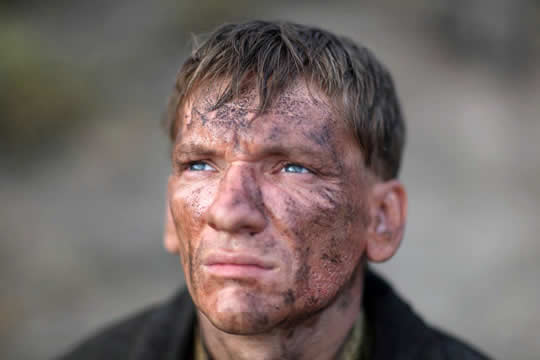 BT: How do you see the prospects of the film for being nominated for an Oscar and/or winning? And how would it help this film and Russian cinema?
BT: How do you see the prospects of the film for being nominated for an Oscar and/or winning? And how would it help this film and Russian cinema?
KS: Once you are in the race, you always want to win. On the other hand, it is also important that this Oscar entry makes the film more visible and I believe this will have positive effects for Russian cinema.
BT: One more question is about the beautiful work Aleksandr Kuznetsov did in the cinematography of the film. How did you come up with the visual style of the film?
KS: Our task was to have a very free camera so that the viewer would feel as if being inside the picture, amid the story. So most scenes were shots on steady-cam and most shots were shot with natural light. That made things look like real life. At least, this is what we tried to do.
BT: Under you leadership, MOSFILM has become a major production house in Europe. How do you see the future of Russian cinema and its chances on the international market?
KS: Of course, I would like Russian cinema to take up more space in the world cinema industry. I should say that today we have a very powerful film industry in Russia but this is just the beginning of the way. The Soviet film industry was actually destroyed at one point and we had to rebuild everything from the ground level. International contacts and co-productions are something that we are looking at. Basically cinema in its nature is an international affair and this is what we are lacking at the moment in Russia.
To attend the screening of WHITE TIGER and the reception following the screening on December 3 at The Landmark in West LA please RSVP to SashaBerman@mac.com or at 310-450-5571.

